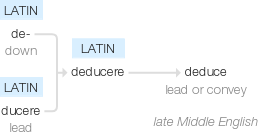Deduce
late Middle English (in the sense ‘lead or convey’): from Latin deducere, from de- ‘down’ + ducere ‘lead’.
wiktionary
From Late Middle English deducen(“to demonstrate, prove, show; to argue, infer; to bring, lead; to turn (something) to a use; to deduct”), [1] borrowed from Latin dēdūcere, the present active infinitive of dēdūcō(“to lead or bring out or away; to accompany, conduct, escort; (figuratively) to derive, discover, deduce”); from dē-( prefix meaning ‘from, away from’) + dūcere (the present active infinitive of dūcō(“to conduct, guide, lead; to draw, pull; to consider, regard, think”), ultimately from Proto-Indo-European *dewk-(“to lead; to draw, pull”)). [2]
etymonline
deduce (v.)
early 15c., deducen, "to show, prove, demonstrate;" late 15c., "to deduct," from Latin deducere "lead down, derive" (in Medieval Latin, "infer logically"), from de "down" (see de-) + ducere "to lead" (from PIE root *deuk- "to lead"). The usual modern sense of "draw a conclusion from something already known" is first recorded 1520s, from Medieval Latin. Related: Deduced; deducing.
